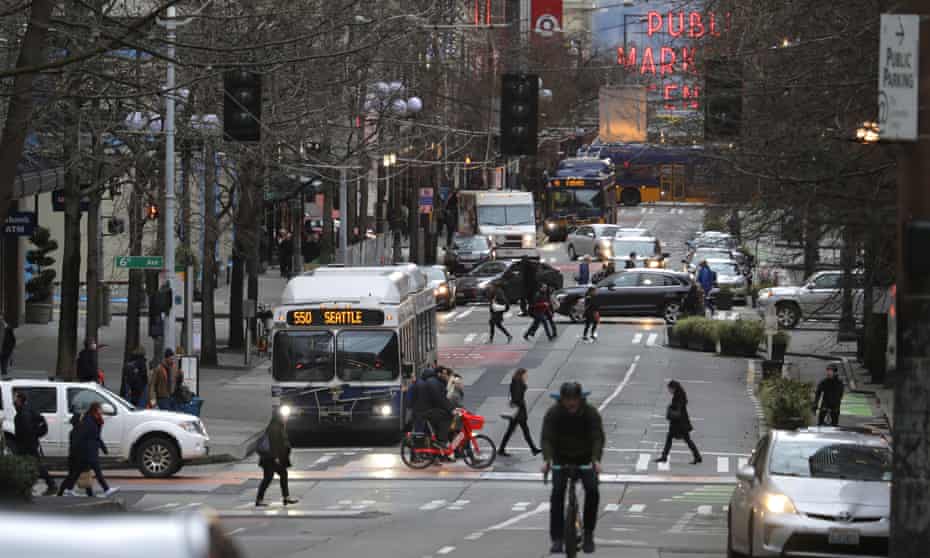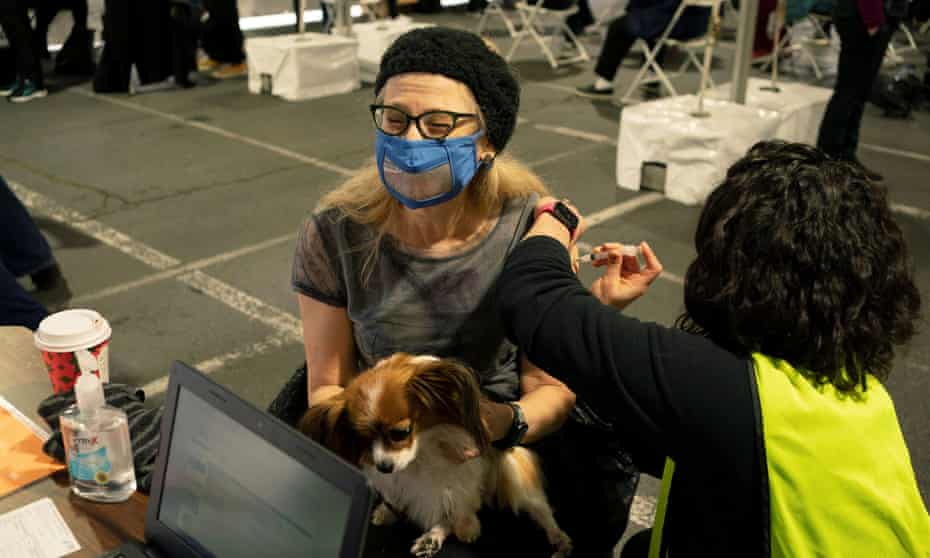Last year, four days after the first recorded Covid-19 death in the United States was reported in Kirkland, Washington, just east of Seattle, Microsoft leaders jumped into action – recommending that their employees in the area work from home. Two days later, Amazon made a similar declaration.
Combined, their announcements affected more than 100,000 employees in this Pacific north-west tech hub and came days before the Washington state governor’s first major Covid mandate and more than a week before the US president declared an emergency for Covid.
The move by two of the largest tech companies in the region as the area suddenly found itself at the center of the country’s coronavirus pandemic set the tone for other local businesses, explained Dr Christopher Murray, director of the Institute for Health Metrics and Evaluation (IHME), a research center that produces a wide array of projections on Covid.
“That made it much more likely that everybody else would send people home. And that meant that we got the anticipatory decline in the transmission sooner, even sooner than the state mandates came in,” he told the Guardian. “And I think that – as sort of trendsetters – was a really important thing as large employers in the region.”
He added: “What we have learned is that the earlier you act, the more impact it has on transmission. Getting ahead of transmission really makes a very big difference.”
King county has gone from having the most coronavirus deaths in the US, to the lowest death rate when compared with the 20 most populous counties in the country, according to data sent to the Guardian from Johns Hopkins University. The New York Times also reported earlier this month that the Seattle area has the lowest death rate when compared with the 20 largest metropolitan regions in the US. The county also has the lowest rate of cases per million people.
While many factors have surely contributed to such a significant change, health and business experts in the region point to the role that the local tech industry has played from the virus’s earliest days. From Microsoft and Amazon to Qumulo and Tableau, these companies worked across sectors and in some cases with key competitors to spearhead and support the effort to combat this deadly virus and help those most affected by it in their own backyard.
There were the employees from Amperity, an AI-powered data management company in Seattle, who helped build a website for The Plate Fund, which supports out-of-work restaurant workers, and also Facebook Seattle’s donation of over 85,000 gloves, masks and thermometers to through the King county regional donations connector. There was also Tableau, which developed the data visualization software that King county has used to spread awareness about the virus, and SmartSheet, a software company in Bellevue, just east of Seattle, which started offering its coronavirus preparedness template set free.

“I would definitely say they’ve had a big impact,” said Dr Jay Shendure, a geneticist at the University of Washington School of Medicine who was involved in the detection of the first reporting of a case of community transmission in the US. “From the point of view of being major employers, through kind of effectively philanthropic support of the community through the crisis. And through, kind of, some of these activities that leverage their capabilities in terms of the actual tech itself.”
He gave the example of WA Notify, a contact tracing tool for the state that has enrolled more than a quarter of the population in its first few months. It came out of the CommonCircle app, which was initially developed through UW Computer Science and Microsoft Research.
Microsoft and Amazon also stepped in, Shendure said, when it came to the Seattle Coronavirus Assessment Network (Scan), a research study examining how the virus is spreading throughout the region (Shendure is also one of its principal investigators). While Amazon shipped almost 4,000 testing kits, Microsoft created the Scan HealthBot, which gives epidemiologists a simple way to gather important information from those being tested.
But Shendure did note the issue of equity during the pandemic in this region and beyond when it comes to testing, access to care and the toll the virus takes on some communities compared with others. Research shows communities of color are at increased risk for the virus and have been disproportionately affected. One way that disparity can manifest, he explained, is when it comes to access to technology and the many digital tools that are particularly helpful in combating coronavirus.
Michael Schutzler, CEO of the Washington Technology Industry Association, said beginning on 3 March last year, a group of more than 100 CEOs from local tech companies in the state started holding near-weekly virtual meetings to discuss the virus and how they could help.
They contributed laptops, donated to relief organizations and connected with public officials so they could offer whatever assistance might be most needed. But one of their first key discussions was surrounding in-person work.
“We shut our operation down immediately and told our members, ‘here’s what we’re doing, here’s why we’re doing it, and we think you should really seriously consider doing the same thing’ … And we helped encourage a lot of people to shut down long before there was a lockdown order,” said Schutzler.
A few weeks later when it became clear just how big an impact Covid and its resulting shutdowns were going to have on the Seattle area, another group of about 20 community members came together to quickly launch a fundraising effort called All In Seattle.
It was meant to “raise awareness for the need and to help people, inspire people to donate right away to organizations that are helping already”, explained Jill Singh, a community volunteer, who along with her husband, Rajeev Singh, CEO of the local healthcare tech company, Accolade, was instrumental in this work.
With the help of employees from Accolade, as well as Amperity, they created a website and started getting the word out over social media. Within 72 hours, they had raised $27m from 200 donors, including such tech giants as Jeff Bezos of Amazon, Satya Nadella of Microsoft, Adam Selipsky of Tableau and Rich Barton of Zillow – and directed that funding to a wide array of local organizations.
Although much of the initial effort from the local tech industry was done with an eye toward the immediate community, the impact tended to have a much broader reach.

IHME, which is based in Seattle, released its US Covid-19 forecasts for every state in the US on 26 March, which were the first state-level projections of their kind. Murray explained that within two days their results started being used at White House press briefings and their website traffic burgeoned into the millions.
Recognizing the need to continue to quickly put out this data, they turned to Microsoft to help them fast-track their modeling and Qumulo, a local data storage company, to help with data growth. Then Redapt, a nearby technology solutions provider, donated a much-needed $200,000 GPU server for them to use for this work.
According to data provided to the Guardian by IHME, King county’s average number of deaths is expected to decline starting in April and hit zero by October. Its number of cases is expected to follow a similar trajectory.
But with new variants popping up and restrictions being lifted (Microsoft announced on Monday that it would give employees in the Seattle area the option to start working in the offices), it’s difficult to know what the future holds.
One place to look to as the pandemic continues to play out will be the relationships between the tech and health industry. Matt McIlwain, managing director for Madrona Venture Group and a board member of Fred Hutchinson Cancer Research Center, said these trusted relationships had been a key factor in Seattle’s work to combat the virus over the last year.
“That, I think, really helped the Seattle community come together, work together and solve problems, you know, that were important to solve.”
This content first appear on the guardian
